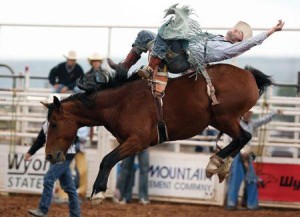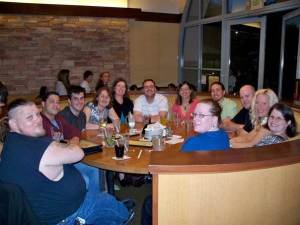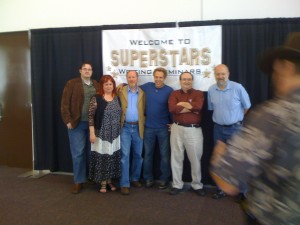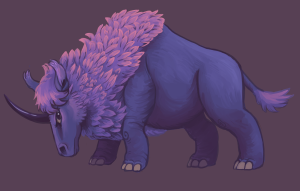We’ve all heard the statistics of the odds of getting published as a writer. The stat most often thrown around is less than one percent of stories submitted for publication are ever actually accepted and published, let alone make any money from it.
Some look at the act of being published like a lottery, like it’s a matter of chances and getting lucky.
 My friend was in the pro rodeo bareback circuit (ranked in the top 10 in the US by winnings) and happened to have a layover in Phoenix, so he delayed his connecting flight and went out to the little rodeo in my town. I took the family to see him ride. Now I’ve been to a few rodeos and enjoy the events but know very little about form and technique. I’d tell you he rode well because he didn’t fall off during the eight seconds, but beyond that, I couldn’t tell you why his score was significantly higher than the others that also didn’t fall off.
My friend was in the pro rodeo bareback circuit (ranked in the top 10 in the US by winnings) and happened to have a layover in Phoenix, so he delayed his connecting flight and went out to the little rodeo in my town. I took the family to see him ride. Now I’ve been to a few rodeos and enjoy the events but know very little about form and technique. I’d tell you he rode well because he didn’t fall off during the eight seconds, but beyond that, I couldn’t tell you why his score was significantly higher than the others that also didn’t fall off.
After the event, he told me that the other riders hated that he showed up because usually those with his skills and winnings stayed away from the small time rodeos, giving others a chance to start winning something. I guess it’d be like Stephen King entering a local writing contest and making off with the grand prize of $100.
I asked him what he did that the other riders didn’t do and he tried to explain that he was scraping the bronco high on the shoulder with his spur and that made the animal jump higher and buck better in a sort of pattern. He definitely knew and understood his craft, though it made little sense to me.
As an aspiring writer, I thought my craft was great until a writing group set me straight, and a friend, and an editor, and another, and another. My point is that as I’ve grown as a writer, my understanding of my craft has changed and now I see that my work from a couple years ago was just awful.
A writer might have as much chance of getting on the pro rodeo circuit as getting published, but it isn’t a lottery. It’s a matter of getting back on the horse every time and writing better. Those one percent didn’t just wake up one day and decide to write a publishable piece. They wrote, got rejected, wrote some more, improved, got rejected some more, and improved some more until they developed enough skill to get published.
 There is a great writing seminar to add to one’s proverbial belt, where Kevin J Anderson discusses his popcorn theory. To get the full gist, you’ll need to attend Superstars and it’s so worth it, I’m going again, so maybe we’ll see each other there. But in brief, the seminar gave me an idea that I should take every chance I came across to write. “I can do that,” as Kevin put it.
There is a great writing seminar to add to one’s proverbial belt, where Kevin J Anderson discusses his popcorn theory. To get the full gist, you’ll need to attend Superstars and it’s so worth it, I’m going again, so maybe we’ll see each other there. But in brief, the seminar gave me an idea that I should take every chance I came across to write. “I can do that,” as Kevin put it.
And I have done that. I was invited to guest post with the Fictorians and then invited back several times. I went out of my way to be on time and do a good job, which probably led to their inviting me to write for the Fictorians as a full fledge member.
I also started a personal blog. It’s a journal of sorts and discusses my personal spiritual journey, but there seems to be a niche for it. I’ve tried to post about once a month and each posting receives around five hundred hits. If I ever get anything published, these five hundred may be interested in reading something else that I’ve written.
I’ve also been asked to write articles at work. I’m in finance and my main job is as a CFO of a biotech firm. I’ve written a couple articles for the firm (and it’s a great source for research and ideas related to my sci-fi stories).
Not to long ago I took on a client that deals in antiques. There was a local paper known as the Antique Register and I wrote an article for it. They liked it so much that they asked if they could put it in their national paper known as the Country Register that distributes from California to Rhode Island and Canada. So now I’m on my third article. They’ve sent me dozens of the different editions from all over the nation and Canada each with my articles in them.
This led to me submitting articles for two other papers.
In the meanwhile I’m working on a couple novels and searching for an agent that can help me sell a finished historical fiction.
My goal is to get published and I can see that I’ve come along way and I think I am getting close, but I still continue to improve and write and work at bettering my craft. And I do that by writing wherever, whatever, however I can. If there are enough popcorn kernels in the pan, something is bound to pop eventually if I keep stirring it up and adding heat. I’ll see you on the pro circuit.
 I live in Arizona with my family, wife and five kids and a little dog. I write fiction, thrillers and soft sci-fi with a little short horror on the side. I’ve got an MBA and work in finance for a biotechnology firm.I volunteer with the Boy Scouts, play and write music, and enjoy everything outdoors. I’m also a novice photographer.You can visit my author website at www.jacekillan.com, and you can read some of my works by visiting my Wattpad page.
I live in Arizona with my family, wife and five kids and a little dog. I write fiction, thrillers and soft sci-fi with a little short horror on the side. I’ve got an MBA and work in finance for a biotechnology firm.I volunteer with the Boy Scouts, play and write music, and enjoy everything outdoors. I’m also a novice photographer.You can visit my author website at www.jacekillan.com, and you can read some of my works by visiting my Wattpad page.


 Okay, as for the other questions. What is
Okay, as for the other questions. What is  Who? Anyone who hasn’t attended SSWS in past years is eligible to apply for the scholarship. The instructors are
Who? Anyone who hasn’t attended SSWS in past years is eligible to apply for the scholarship. The instructors are 

 That is a rare camaraderie to have with a group this size, but it’s there and it’s precious.
That is a rare camaraderie to have with a group this size, but it’s there and it’s precious.